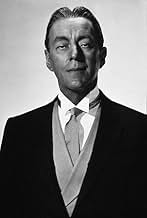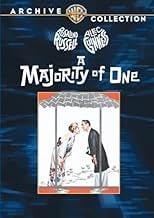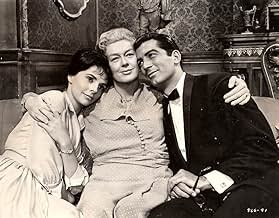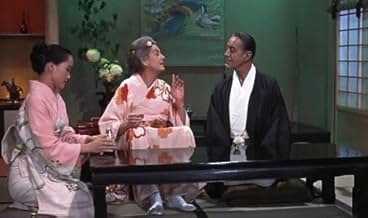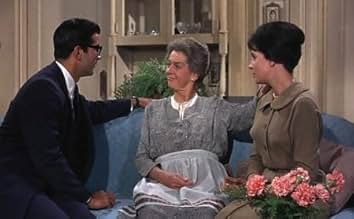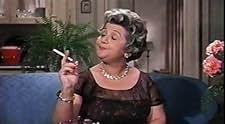Aggiungi una trama nella tua linguaA gentle love story about a Japanese businessman and widower, and a Brooklyn widow. But before a happy ending can ensue, they must learn again the lessons of tolerance, kindness, and forgive... Leggi tuttoA gentle love story about a Japanese businessman and widower, and a Brooklyn widow. But before a happy ending can ensue, they must learn again the lessons of tolerance, kindness, and forgiveness.A gentle love story about a Japanese businessman and widower, and a Brooklyn widow. But before a happy ending can ensue, they must learn again the lessons of tolerance, kindness, and forgiveness.
- Candidato a 1 Oscar
- 3 vittorie e 4 candidature totali
Mae Questel
- Essie Rubin
- (as Mae Questal)
Harriet E. MacGibbon
- Lily Putnam
- (as Harriet MacGibbon)
Lillian Adams
- Mrs. Stein
- (non citato nei titoli originali)
Leon Alton
- Ship Passenger
- (non citato nei titoli originali)
Monya Andre
- Ship Passenger
- (non citato nei titoli originali)
Mary Chan
- Spectator at Disembarkation
- (non citato nei titoli originali)
Spencer Chan
- Ship Passenger
- (non citato nei titoli originali)
Trama
Lo sapevi?
- QuizWhen Eddie is repairing Mrs. Jacoby's TV, rather than actually shooting the scene with material already selected and pre-recorded to be seen on the TV's screen, the filmmakers used another, less expensive trick; since TV scan rates are not the same as film, whenever a TV is seen (and it's showing something being broadcast), the dark scan lines are visible (and sometimes the TV's picture will "roll"). As this was still early in the TV-era, showing TVs broadcasting was something of a novelty, but it came with the aforementioned problems. To combat this, a "TV" was built (or, more accurately, something which looked like a TV). What's being shown on the "screen"' is actually film, which is being projected from behind the scene, and with the aid of a mirror, and a semi-translucent material to give the illusion of a screen, the result is that a high-quality image is seen, and there's no problem synching camera with TV.
- BlooperThe steering wheel of the taxi cab is on the wrong side.
- ConnessioniReferenced in The Human Jungle: Struggle for a Mind (1964)
- Colonne sonoreWhere Am I? (Am I in Heaven?)
(uncredited)
Music by Harry Warren
Played when Mrs. Jacoby and Mr. Asano discuss the dateline and Russia on board the ship
Recensione in evidenza
Unlike a few of her female contemporary film stars from the Thirties, Rosalind Russell managed to avoid the perils of being cast in horror films because it was the only roles she was offered. I think only Katharine Hepburn exercised better discretion in her parts even if for Russell they weren't always completely successful with audiences and critics.
Case in point is A Majority Of One. The play by Leonard Spiegelgass ran for 559 performances in the 1959-1960 season, it was a popular hit as well with Jewish audiences. Mainly because the play was done by THE Jewish American mother from radio and television, Gertrude Berg. As a small kid I do recall the lives and loves of Molly Goldberg and her family were almost a rite on the nights it was broadcast for my Jewish relatives. Berg was a natural for the part of the Jewish widow from 776 Eastern Parkway in Brooklyn.
Anyway this tall prominent lay Catholic from Connecticut does give it a good try and she succeeds in many ways. Today's audiences in seeing this film don't have the memory of Gertrude Berg as Molly Goldberg to fall back on, so Russell's performance is more likely to be judged on its own merits. It's not a bad one.
The other casting however was and remains more controversial. Alec Guinness is one of those actors who can play just about any racial or ethnic type and has. He succeeded his fellow countryman Cedric Hardwicke who played the role of the Japanese industrialist on Broadway. Doesn't mean he should have though. If A Majority of One were made even 20 years later and if players were frozen in time, Jack Warner might have given serious consideration to casting a real Japanese in Sessue Hayakawa as the Japanese widower industrialist. That would have really been something, but at that time the film would have bombed at the box office.
Interesting too because the subject of the film is overcoming our prejudices. Rosalind Russell's son was killed in the Pacific Theater in World War II. She's a widow and when her son-in-law Ray Danton who is a career foreign service officer her daughter, Madelyn Rhue and Danton think she ought to go to Japan where he's been assigned his next post.
They fly to the Pacific and take a sea voyage to Japan where Russell meets Alec Guinness, a widower who's daughter was killed at Hiroshima. Despite his strict Buddhist faith and her Orthodox Jewish background, love can bloom in the strangest places and is good the second time around.
Russell admired Guinness's cerebral technique and total concentration on character when she worked with him. In a recent biography of Alec Guinness, nothing was mentioned about him and Russell, but he felt he was not given any kind of direction from Mervyn LeRoy. Both Russell and Guinness were heavy into Catholicism so I'm betting they got along.
Two members of the original Broadway cast made it to Hollywood, Mae Questal as Russell's neighbor and Marc Marno as their Japanese servant when they set up home in Japan. Questal has an interesting scene with Ray Danton when she announces she just doesn't like her new Puerto Rican neighbors. Danton rather self-righteously upbraids her for her prejudice, but then comes face to face with his own after making a fool of himself with Guinness during business and then facing the prospect he might have an oriental stepfather-in-law.
A Majority of One is a good film, in many ways better enjoyed now than when it first came out. But it misses greatness due to the timidity of the times in Hollywood.
Case in point is A Majority Of One. The play by Leonard Spiegelgass ran for 559 performances in the 1959-1960 season, it was a popular hit as well with Jewish audiences. Mainly because the play was done by THE Jewish American mother from radio and television, Gertrude Berg. As a small kid I do recall the lives and loves of Molly Goldberg and her family were almost a rite on the nights it was broadcast for my Jewish relatives. Berg was a natural for the part of the Jewish widow from 776 Eastern Parkway in Brooklyn.
Anyway this tall prominent lay Catholic from Connecticut does give it a good try and she succeeds in many ways. Today's audiences in seeing this film don't have the memory of Gertrude Berg as Molly Goldberg to fall back on, so Russell's performance is more likely to be judged on its own merits. It's not a bad one.
The other casting however was and remains more controversial. Alec Guinness is one of those actors who can play just about any racial or ethnic type and has. He succeeded his fellow countryman Cedric Hardwicke who played the role of the Japanese industrialist on Broadway. Doesn't mean he should have though. If A Majority of One were made even 20 years later and if players were frozen in time, Jack Warner might have given serious consideration to casting a real Japanese in Sessue Hayakawa as the Japanese widower industrialist. That would have really been something, but at that time the film would have bombed at the box office.
Interesting too because the subject of the film is overcoming our prejudices. Rosalind Russell's son was killed in the Pacific Theater in World War II. She's a widow and when her son-in-law Ray Danton who is a career foreign service officer her daughter, Madelyn Rhue and Danton think she ought to go to Japan where he's been assigned his next post.
They fly to the Pacific and take a sea voyage to Japan where Russell meets Alec Guinness, a widower who's daughter was killed at Hiroshima. Despite his strict Buddhist faith and her Orthodox Jewish background, love can bloom in the strangest places and is good the second time around.
Russell admired Guinness's cerebral technique and total concentration on character when she worked with him. In a recent biography of Alec Guinness, nothing was mentioned about him and Russell, but he felt he was not given any kind of direction from Mervyn LeRoy. Both Russell and Guinness were heavy into Catholicism so I'm betting they got along.
Two members of the original Broadway cast made it to Hollywood, Mae Questal as Russell's neighbor and Marc Marno as their Japanese servant when they set up home in Japan. Questal has an interesting scene with Ray Danton when she announces she just doesn't like her new Puerto Rican neighbors. Danton rather self-righteously upbraids her for her prejudice, but then comes face to face with his own after making a fool of himself with Guinness during business and then facing the prospect he might have an oriental stepfather-in-law.
A Majority of One is a good film, in many ways better enjoyed now than when it first came out. But it misses greatness due to the timidity of the times in Hollywood.
- bkoganbing
- 14 lug 2008
- Permalink
I più visti
Accedi per valutare e creare un elenco di titoli salvati per ottenere consigli personalizzati
Dettagli
- Data di uscita
- Paese di origine
- Lingue
- Celebre anche come
- A Majority of One
- Luoghi delle riprese
- Azienda produttrice
- Vedi altri crediti dell’azienda su IMDbPro
- Tempo di esecuzione2 ore 36 minuti
- Proporzioni
- 1.85 : 1
Contribuisci a questa pagina
Suggerisci una modifica o aggiungi i contenuti mancanti

Divario superiore
By what name was Il molto onorevole ministro (1961) officially released in India in English?
Rispondi

